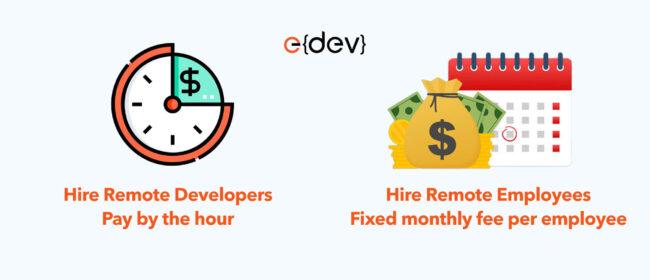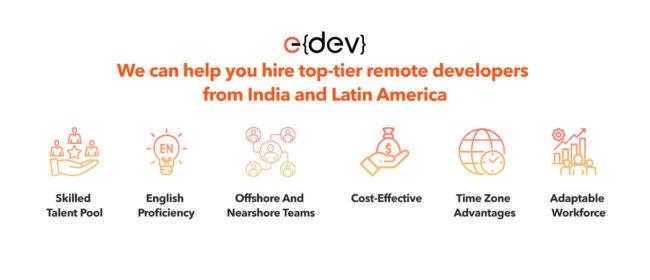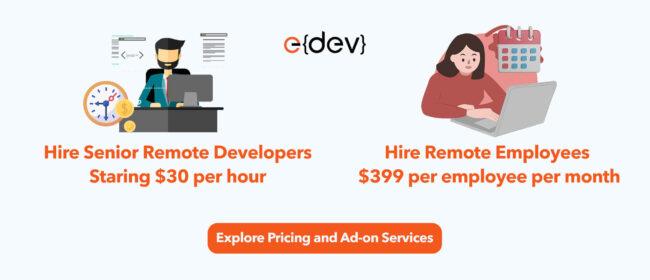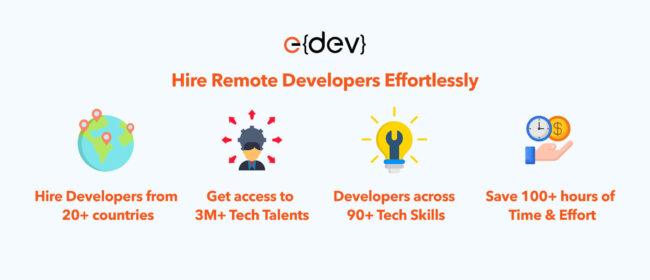6 Key Challenges in the Tech Industry Solved by Global Hiring Platforms
In today’s hyper-competitive tech landscape, businesses face a myriad of challenges that demand innovative solutions. From talent shortages and escalating costs to the need for scalable and adaptable workforce strategies, navigating these obstacles requires a fresh approach. Enter remote developers and global hiring platforms—two transformative forces reshaping the way tech companies recruit, manage, and leverage talent.
In this blog, we’ll delve into the game-changing impact of global hiring platforms on the tech industry. We’ll explore how this innovative approach addresses critical business challenges, from talent acquisition and cost optimization to workforce scalability and specialized skill acquisition. Join us as we uncover the transformative potential of remote work and global hiring platforms in shaping the future of technology-driven businesses.
Talent Scarcity:
Problem Statement: Traditional recruitment methods often limit the talent pool to specific geographic locations, making it challenging to find the right expertise. Tech companies often struggle to find the right fit within their local talent pool, leading to talent shortages and recruitment difficulties.
Solution: Global hiring platforms connect companies with a diverse pool of talent from around the world. By leveraging these platforms, businesses can access a vast network of skilled developers with varied backgrounds and expertise from around the globe. This eliminates geographical barriers and expands the talent pool, ensuring companies find the right talent for their projects, regardless of location. These platforms utilize advanced algorithms and candidate-matching techniques to connect companies with developers possessing the exact skills and experience they need.
Cost Constraints:
Problem Statement: Tech companies, especially startups and small businesses, often face significant cost constraints when building an in-house development team within local boundaries. Talent shortages within specific geographic regions can drive up the cost of hiring skilled professionals. As a result, companies may struggle to find the right talent within their budget constraints. Moreover, the costs associated with maintaining a physical workspace, providing equipment, and offering competitive salaries can quickly add up.
Solution: Hiring platforms enable businesses to tap into a global talent pool where the cost of living may be lower in emerging markets. As a result, companies can find quality talent with the required expertise at more competitive rates compared to local hires.
Outsourcing recruitment tasks to global platforms also streamlines the hiring process, saving valuable time and effort for internal HR teams. Automated candidate screening and selection processes offered by these platforms further enhance efficiency and reduce administrative costs.
By leveraging global hiring platforms, companies can not only reduce recruitment costs but also eliminate overheads associated with maintaining a physical office and providing equipment for in-house teams. Remote developers typically work from their own locations, reducing the need for dedicated office space and office-related expenses.
Overall, hiring remote developers through platforms like eDev can significantly reduce operational costs for tech companies. By accessing talent from diverse geographic locations and leveraging cost-effective hiring strategies, businesses can optimize resource allocation, access top-tier talent, and achieve greater cost efficiency in their development projects. This approach not only addresses immediate cost constraints but also positions companies for long-term financial sustainability and growth in the competitive tech industry.
Scalability and Flexibility:
Problem Statement: Tech companies often struggle to scale their workforce according to project demands, leading to inefficiencies and delays. The ability to scale resources according to project demands is essential for tech companies of any size.
Solution: Tech companies operate in a dynamic environment where project demands can fluctuate over time. Scaling a traditional in-house team to meet these changing demands can be challenging and resource-intensive. However, hiring remote developers through global platforms offers a flexible and scalable solution to address these challenges.
Global hiring platforms provide multiple hiring models that cater to different project requirements and business needs. Companies can choose from various engagement options, including part-time or short-term contracts, hourly-based engagements, or full-time employment through the Employer Of Record model. This flexibility allows businesses to scale their workforce up or down based on project requirements without being locked into rigid employment structures.
Moreover, these platforms offer the flexibility to switch between different hiring models as needed. Companies can seamlessly transition between part-time, short-term, or full-time arrangements depending on project timelines, resource needs, or budget constraints. This adaptability empowers businesses to optimize resource allocation and maximize operational efficiency without compromising on project delivery.
Another key advantage of hiring through global platforms is the ability to terminate employment or end contracts without compliance issues or penalties. Unlike traditional employment arrangements that may involve complex termination procedures or legal implications, remote hiring platforms streamline the offboarding process, ensuring a smooth transition when scaling down or completing projects.
By leveraging the scalability and flexibility offered by global hiring platforms, tech companies can align their workforce with project demands effectively. Whether scaling up for new initiatives or adjusting resource allocation during lean periods, businesses can optimize operational efficiency and achieve better outcomes while mitigating risks associated with traditional employment models. This approach not only enhances agility and responsiveness but also enables companies to adapt to evolving market conditions and maintain a competitive edge in the tech industry.

Specialized Skill Acquisition:
Problem Statement: In the fast-paced tech industry, staying ahead of the curve often requires niche expertise in emerging technologies. Emerging technologies require specialized skills that may be difficult to find within local talent pools.
Solution: Global hiring platforms specialize in connecting companies with developers possessing niche expertise in cutting-edge technologies. Whether it’s AI, blockchain, or cybersecurity, these platforms provide access to top talent from around the world. By leveraging the extensive network of talent available on these platforms, businesses can quickly find and onboard specialists or top talent from around the world in a matter of days, ensuring they stay ahead of the curve and remain competitive in the market.
Streamlined Recruitment Process:
Problem Statement: The traditional recruitment process can be time-consuming and resource-intensive, leading to inefficiencies and delays in hiring.
Solution: Global hiring platforms streamline the entire recruitment lifecycle, from candidate sourcing to onboarding. These platforms leverage advanced technologies such as AI-driven screening to automate repetitive tasks and provide data-driven insights. Some of these platforms also offer “Interview as a service”, where domain or tech experts conduct multiple rounds of rigorous tech interviews and coding challenges to evaluate candidates’ technical capabilities and problem-solving skills to select the right fit. By outsourcing recruitment to these platforms, companies can save valuable time and effort, allowing them to focus on core business objectives and project operations.
Workforce Adaptability:
Problem Statement: In today’s interconnected world, building a resilient and adaptable workforce is essential for navigating uncertainties in the tech industry.
Solution: Global hiring platforms enable companies to diversify their talent pool, tapping into a global network of remote developers with diverse backgrounds and skill sets. This diversity fosters innovation and resilience, allowing businesses to thrive in a rapidly changing environment.
Remote developers have extensive experience working with clients from diverse backgrounds, which equips them with valuable cross-cultural communication skills. This experience enables them to seamlessly integrate into multicultural teams and navigate complex project dynamics effectively. By leveraging the expertise of remote developers, companies can diversify their talent pool and minimize the impact of disruptions such as natural disasters or geopolitical events.
Additionally, partnering with cutting-edge HR platforms or hiring platforms further enhances workforce adaptability. These platforms go beyond conventional recruitment processes by assessing candidates not only for technical proficiency but also for cultural fit and communication skills. They not only conduct rigorous tech interviews but also assess candidates for cultural fit, ensuring alignment with the company’s values, work culture, and team dynamics. This comprehensive approach to candidate evaluation enables companies to onboard remote developers who can seamlessly integrate into existing teams and contribute to collaborative projects effectively.
By embracing remote work and leveraging global talent, companies can build a workforce that is adaptable, agile, and well-equipped to handle challenges effectively.

In conclusion, hiring remote developers and leveraging global hiring platforms present compelling solutions to the pressing challenges faced by the tech industry. Remote work offers companies the ability to transcend talent shortages, reduce operational costs, and achieve scalability by accessing a diverse pool of talent from around the world. Additionally, remote work enables businesses to adapt to time zone differences and access specialized skills efficiently.
Global hiring platforms play a transformative role in enabling tech companies to thrive in today’s competitive landscape. By providing access to a diverse talent pool and offering cost-effective alternatives to traditional recruitment methods, these platforms empower businesses to optimize resource allocation and drive innovation. Moreover, global hiring platforms facilitate workforce adaptability, specialized skill acquisition, and streamlined team management, positioning companies for sustained growth and success.
As remote work continues to gain prominence as the new normal, businesses that embrace remote developers and global hiring platforms will gain a competitive edge in an increasingly interconnected global marketplace. By harnessing the power of remote talent and innovative recruitment strategies, tech companies can navigate challenges effectively and capitalize on emerging opportunities in the digital era.




